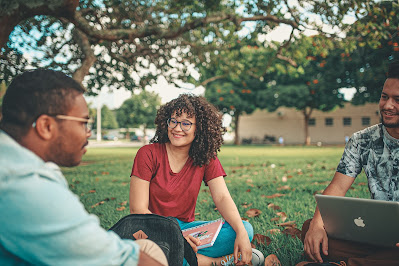How to develop a good listening habit
- Get link
- X
- Other Apps
Good listening habits are essential in our daily interactions with others. Whether it is in personal relationships, in the workplace, or in any other social setting, the ability to listen effectively can greatly improve our relationships and communication skills. However, developing good listening habits is not always easy, as it requires effort and a commitment to change. In this article, we will discuss how to develop and maintain good listening habits.
The first step to developing good listening habits is to understand the barriers to effective listening. There are several common distractions that can prevent us from truly listening to what someone is saying. For example, electronic devices such as smartphones and laptops can be major distractions, taking our attention away from the speaker and causing us to miss important information. Another barrier to effective listening is the presence of assumptions and prejudices. We may have preconceived ideas about the speaker or the topic they are discussing, which can cause us to tune out and miss important points.
In order to develop good listening habits, we must first practice active listening. Active listening involves giving the speaker our full attention and avoiding interruptions and distractions. This means putting aside any distractions, such as electronics, and focusing solely on what the speaker is saying. It also means avoiding interruptions and distractions, such as multitasking or thinking about something else while the speaker is speaking. In addition, it is helpful to repeat or paraphrase what the speaker has said, as this shows that we are paying attention and helps us to understand the message better.
Another key aspect of developing good listening habits is avoiding distractions. To do this, it is important to turn off electronic devices or put them away during conversations. Additionally, it is helpful to find a quiet place to hold conversations, as background noise can be a major distraction. Finally, it is important to remove any physical distractions, such as fidgeting or looking around the room, which can take our focus away from the speaker.
Asking questions is another important part of developing good listening habits. This helps to clarify our understanding of what the speaker is saying and also shows that we are interested in the topic. Additionally, asking questions can encourage the speaker to continue speaking and provide more information. However, it is important to avoid asking too many questions or interrupting the speaker, as this can be distracting and take away from the conversation.
Empathy is also an important part of developing good listening habits. This involves trying to understand the speaker's perspective and avoiding making assumptions about what they are saying. Additionally, it is important to show compassion and understanding, as this can help to build trust and strengthen the relationship between the speaker and the listener.
In order to maintain good listening habits, it is important to practice regularly. This can be done by setting goals for ourselves and seeking feedback from others to see how we can improve. Additionally, reflecting on our personal progress can help us to see where we need to make changes and continue to grow in our listening skills.
Developing good listening habits is essential for improving our relationships and communication skills. By practicing active listening, avoiding distractions, asking questions, and showing empathy, we can develop the habits necessary to be effective listeners. Additionally, by setting goals, seeking feedback, and reflecting on our progress, we can maintain these habits and continue to grow in our listening skills. Good listening habits can have a major impact on our relationships and overall communication abilities, so it is important to make a conscious effort to develop and maintain these habits.
Understanding the barriers to good listening
Good listening habits are an essential part of effective communication and building strong relationships. However, there are several barriers that can prevent us from truly listening to others and understanding what they are saying. Understanding these barriers is the first step to overcoming them and developing good listening habits. In this article, we will discuss the common barriers to effective listening and how to overcome them.
One of the most common barriers to effective listening is distractions. These distractions can take many forms, including electronic devices such as smartphones and laptops, background noise, and physical distractions like fidgeting or looking around the room. Electronic devices, in particular, can be a major distraction, taking our attention away from the speaker and causing us to miss important information. To overcome this barrier, it is important to turn off electronic devices or put them away during conversations, find a quiet place to hold conversations, and remove physical distractions.
Another barrier to effective listening is assumptions and prejudices. We may have preconceived ideas about the speaker or the topic they are discussing, which can cause us to tune out and miss important points. To overcome this barrier, it is important to approach each conversation with an open mind and avoid making assumptions about what the speaker is saying. Additionally, it is important to understand that everyone has their own unique perspective, and by being open to hearing different perspectives, we can broaden our understanding and avoid missing important information.
A lack of focus is another common barrier to effective listening. This can be due to many factors, including stress, fatigue, or simply not being interested in the topic being discussed. To overcome this barrier, it is important to approach each conversation with a sense of focus and commitment to truly listen to what the speaker is saying. Additionally, taking breaks and managing stress can help to improve our focus and ability to listen effectively.
Emotional reactions can also be a barrier to effective listening. For example, if the speaker is discussing a topic that is emotionally charged, we may become defensive or reactive, causing us to miss important information. To overcome this barrier, it is important to approach each conversation with emotional intelligence and be aware of our own emotions and reactions. Additionally, it is important to practice empathy, as this can help us to understand the speaker's perspective and avoid letting our emotions get in the way of truly listening.
By understanding these barriers and taking steps to overcome them, we can develop good listening habits and improve our communication skills. Whether in personal relationships, the workplace, or any other social setting, effective listening is an essential skill that can greatly improve our relationships and overall communication abilities.
Developing good listening habits
Developing good listening habits is an essential part of effective communication and building strong relationships. Good listening skills can help us to better understand others, resolve conflicts, and improve our overall relationships. In this article, we will discuss the importance of active listening, avoiding distractions, asking questions, and practicing empathy in developing good listening habits.
A. Practice Active Listening: Active listening is the process of actively paying attention to what someone is saying, rather than just passively hearing them. Active listening involves not only hearing the words being said but also understanding the emotions and perspectives behind them. To practice active listening, it is important to focus on the speaker, maintain eye contact, and avoid distractions. Additionally, it is helpful to paraphrase what the speaker is saying and ask clarifying questions to ensure that we understand what they are saying.
B. Avoid Distractions: Distractions can take many forms, including electronic devices, background noise, and physical distractions like fidgeting or looking around the room. To avoid distractions, it is important to turn off electronic devices or put them away during conversations, find a quiet place to hold conversations, and remove physical distractions. Additionally, it is important to focus on the speaker and avoid allowing our minds to wander.
C. Ask Questions: Asking questions is an important part of active listening. When we ask questions, we show the speaker that we are interested in what they have to say and are paying attention to their words. Additionally, asking questions can help to clarify our understanding and ensure that we are getting the full picture. To ask effective questions, it is important to listen carefully to what the speaker is saying, avoid interrupting them, and ask open-ended questions that encourage them to share more information.
D. Practice Empathy: Empathy is the ability to understand and share the feelings of others. When we practice empathy, we are better able to understand the speaker's perspective and avoid letting our emotions get in the way of truly listening. To practice empathy, it is important to approach each conversation with emotional intelligence and be aware of our own emotions and reactions. Additionally, it is helpful to try to put ourselves in the speaker's shoes and understand their emotions and experiences.
Whether in personal relationships, the workplace, or any other social setting, effective listening is an essential skill that can greatly improve our relationships and overall communication abilities.
Maintaining good listening habits
Maintaining good listening habits is an important aspect of effective communication and building strong relationships. Once we have developed good listening skills, it is essential to maintain these habits to continue to improve our relationships and overall communication abilities. In this article, we will discuss some tips for maintaining good listening habits.
A. Make it a Priority: Good listening habits should be a priority in our daily lives. Whether we are at home, in the workplace, or in any other social setting, making listening a priority will help us to continue to improve our skills and maintain our good habits. By setting aside time each day to focus on our listening skills, we can make them a habit and continue to improve.
B. Practice Consistently: To maintain good listening habits, it is essential to practice consistently. This means making an effort to listen actively and attentively in each conversation we have, whether it is with family, friends, coworkers, or anyone else. By practicing regularly, we can develop and maintain good listening habits, improving our ability to understand and communicate with others.
C. Be Mindful of Distractions: Distractions can take many forms, including electronic devices, background noise, and physical distractions like fidgeting or looking around the room. To maintain good listening habits, it is important to be mindful of distractions and avoid letting them interfere with our ability to listen actively and attentively. By minimizing distractions, we can stay focused on the speaker and continue to improve our listening skills.
D. Seek Feedback: Another way to maintain good listening habits is to seek feedback from others. This can involve asking family, friends, or coworkers for their thoughts on our listening skills and how we can improve. Additionally, it may be helpful to seek feedback from a mentor, coach, or professional in the field of communication to gain a more objective perspective on our skills.
E. Reflect on Your Listening Habits: Regularly reflecting on our listening habits can help us to maintain good habits and identify areas for improvement. This can involve taking a few minutes each day to reflect on our interactions and how well we listened, or keeping a journal of our interactions and thoughts on our listening skills. By reflecting on our habits, we can identify areas for improvement and continue to develop our skills.
F. Keep Learning: Finally, to maintain good listening habits, it is essential to keep learning. This can involve reading books and articles about effective communication and listening skills, attending workshops or courses on the topic, or seeking feedback and advice from others. By continuing to learn, we can stay up-to-date on the latest techniques and strategies for effective listening, and continue to improve our skills.
By making listening a priority and consistently working to improve our skills, we can maintain good listening habits and continue to improve our relationships and overall communication abilities.
- Get link
- X
- Other Apps


